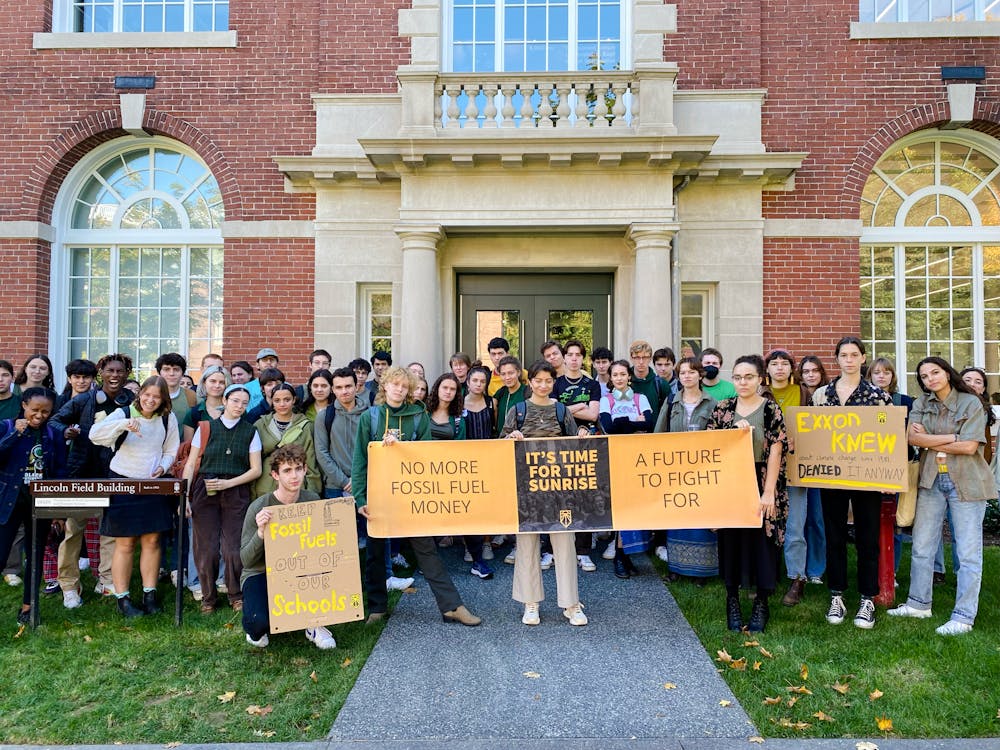After its dissolution in fall 2020, the Brown chapter of Sunrise Movement, a climate advocacy group, relaunched on campus last week.
The chapter has already been active: Sunrise members have promoted a petition asking candidates to replace Provost Richard Locke P’18 to commit to the University’s environmental pledges and disrupted an ExxonMobil recruitment event held on campus last Tuesday, The Herald previously reported.
The Sunrise Movement is a youth-led organization founded in 2017 that advocates for environmental justice and the passage of the Green New Deal — a proposed restructuring of the American economy to favor clean energy and reduce economic and racial inequality — according to their website. The organization has more than 400 “hubs” across the country, according to the website.
The newly-relaunched University chapter consists of four task forces: environmental justice and Providence, operations, actions and University, said Lauren Griffiths ’24, co-lead of the operations group. The task forces are all overseen by the nine students who make up the chapter’s unstructured executive board.
Rise of the new chapter
The history of Sunrise’s College Hill chapter dates back to 2019, when the Brown-Rhode Island School of Design hub split off from the greater Providence hub in response to concerns about accessibility to local activists, The Herald previously reported.
But with the onset of the COVID-19 pandemic in the 2019-20 school year, both the Providence and Brown-RISD chapters lost momentum, with the University chapter ultimately dissolving in late 2020, said Nick Kolbas ’24, a founding member of the University’s new chapter.
According to Kolbas, the relaunched chapter originated in a course he took in the spring with Gregory Hitch PhD’22, who was a graduate student at the time, called ENVS 0705: “Equity and the Environment: Movements, Scholarship, Solutions.” Hitch encouraged his students to revive environmental activism on campus, and as a final project, the class looked into the history of Sunrise Movement at Brown and considered how they could bring back the chapter, Kolbas said.
Students in the class were on board with the relaunch, citing a lack of active environmental groups on campus. “When I came to Brown, I was shocked that there wasn’t an environment group on campus,” said Griffiths, who also took Hitch’s course.
After the spring semester, a small group of students in the class continued working over the summer to “lay the groundwork” for the chapter’s relaunch, Griffiths said. This core group slowly grew as they drew in activist partners from related organizations on campus. This included members of Students Against Koch Influence, a group that seeks to push back against the influence of the Koch Foundation, an organization run by billionaire and conservative political mega-donor Charles Koch, at the University.
The swift relaunch of the chapter was also propelled by the addition of three first-years to the leadership team, Kolbas said. These students “brought so much energy and excitement to” the relaunch and pushed the group to move up the timeline of the club’s return, Kolbas said.
The chapter’s new leadership consists of three first-years, two sophomores and four juniors.
“It’s nice to know that there are younger people who will be able to continue (the chapter’s work) once we graduate,” Griffiths said.
Current leadership and goals
The leaders of the new chapter emphasized that the group’s leadership structure will be informal and fluid. The chapter’s leaders “feel very strongly that this group will evolve and will change,” said Ma’iingan Wolf Garvin ’25, a co-leader of the environmental justice and Providence task force. The chapter is “really focused on collaboration, and as people come in and bring their ideas, (it will) ebb and flow.”
“I don't want this to be another group with an (executive board) that really controls things,” said Ethan Drake ’24, a leader of the University task force. “I have no more standing as a climate activist than anyone else on this campus,” he added.
“Having our task force model and giving students the ability to guide the issues that the group focuses on will keep engagement high,” said Isaac Slevin ’25, the chapter coordinator. The executive board hopes to draw on experienced climate organizers and advocates on campus and “use the collective energy and knowledge we have,” Slevin added.
Additionally, the chapter plans to pay special attention to the way it engages with local environmental justice groups in Providence. The environmental justice and Providence team will focus its efforts on “using the resources and the privilege that we have as Brown students to support the work that is already going on” in Providence, Griffiths said.
“There are a lot of good people doing really good work already” in Providence, Wolf Garvin said, “and our goal is really to see how we can use our resources at Brown to help.” The chapter plans to reach out to local environmental justice groups and see where they could use support from University students. In doing so, they hope to build long-term relationships with these organizations, Wolf Garvin added.
This messaging resonated with students who attended the interest meeting, such as Diana-Abasi Archibong ’26. “The chapter’s leaders understand what it means to be a Brown student in relation to the legacy we inherit” and students’ responsibilities to the greater Providence community, she said.
Archibong attended the interest meeting because she is eager to educate and mobilize the University community around climate issues while also “listening to the needs of the Providence community,” she said. According to Archibong, Sunrise Movement Brown is the right space to engage in this work, as the group is “by students for students” and guided by leaders who “have a unique awareness of the linkage between societal oppression and environmental justice.”
Looking to the future
With the official launch of Sunrise Movement Brown last week, the new chapter and its members have a lot of work ahead, Slevin said. In addition to their petition surrounding the provost position and their protest of last week’s ExxonMobil event, the chapter will spend the next few weeks building out task forces and brainstorming collectively on future projects and actions to pursue, Griffiths said.
According to Drake, the chapter also eventually hopes to expand into RISD, returning the chapter to its pre-pandemic state. Additionally, members hope to establish a media presence in order to get coverage on the work they are doing on campus and with groups in Providence, Drake said.
Despite a busy launch period, the chapter’s leaders and members are eager to get started. “I feel really excited because, for the first time, I am seeing people really, really committed to the things that I am also committed to,” Wolf Garvin said.
Many students came to the University eager to organize and enact change, Wolf Garvin said, and “as Sunrise is starting up, there (will be) a lot of opportunities to have a hands-on role in making that change.”

Sam Levine is a University News editor from Brooklyn, New York covering on-campus activism. He is a senior concentrating in International and Public Affairs.





